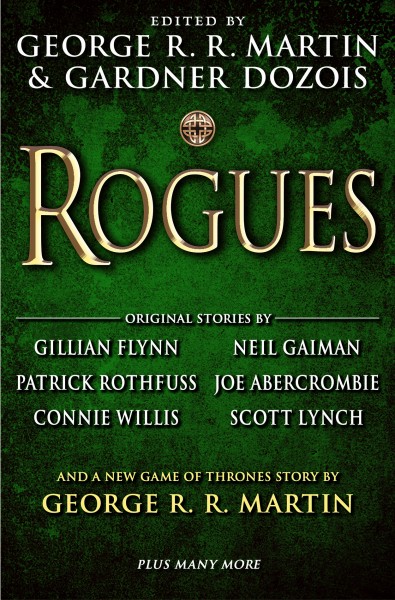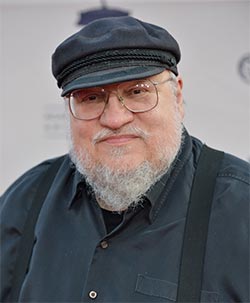
MidAmericon II has opened on-line Hugo nominations, as I reported below… at least for those members who have received their PIN numbers (haven't gotten mine yet, alas). No better time for some more of my thoughts on possible contenders for this year's Hugos. You can find my earlier posts downstream, where I share some of my recommendations for the two Dramatic Presentation awards and Best Professional Artist. Tonight I am going to talk about a more contentious category: Best Editor, Long Form.
Like several of the other problem categories the Long Form Editor Hugo goes to a person, not a work… which means it is subject to the "usual suspects" syndrome that I have discussed previously. Way too many voters don't actually know what the various candidates did during the previous year. This leads to the same people winning the award, year after year after year… most often, the editors with the biggest presence at cons and on the web.
Which is NOT proof of a cabal or a conspiracy, despite what some morons would like to have you believe; it's just proof of human nature, and, well, our own innate human laziness. In the case of this particular category, the problems are exacerbated because "long form" editors — book editors to you and me — are not even credited by the vast majority of publishers. Tor is a notable exception, which is one reason Tor editors have dominated this award since its inception, but even in that case, the editorial credit is not exactly prominent. You have to go looking for it. Most readers, and most Hugo voters, do not bother to look. And aside from Tor, the total absence of credits on the novels themselves means nobody knows who edited anything… well, except the writers.
A little history lesson may be in order. Originally this category was "Best Magazine." That was easy to judge. If you thought GALAXY had the best stories last year, you voted for GALAXY. If you preferred ASTOUNDING, you voted for ASTOUNDING… or F&SF, or IF, or AMAZING (actually, I don't think AMAZING ever won, though it deserved to during the Ted White years). There were seldom more than ten magazines around at any one time (except during brief booms), so everybody knew the contenders and could judge accordingly. In those days, the magazines were the heart of the field.
By the late 60s and early 70s, that was less true than it had been previously. The magazines were still important, but more and more novels were being published, in both hardcover and paperback, and there was a boom in original anthologies as well (before that, most anthologies were made up of reprints). By offering higher rates than the magazines, anthology editors like Damon Knight, Robert Silverberg, and Terry Carr lured a lot of best, cutting-edge short fiction away from the magazines to "book magazines" like ORBIT, NEW DIMENSIONS, and UNIVERSE. Accordingly, the old "Best Magazine" Hugo was abandoned in favor of "Best Editor," so that the anthology editors and the book editors could also be recognized for their efforts.
A funny thing happened, though. Even though the award was no longer restricted to magazines, the magazine editors continued to dominate it, year after year, decade after decade. Ben Bova took over ANALOG after John Campbell's death, and won six. When ASIMOV'S was founded, its first editor George Scithers, took two in a row. He was followed by Shawna McCarthy, who won a couple, and Gardner Dozois, who won something like seventeen. Ed Ferman finally got a couple for his long run at F&SF, and Kris Rusch took one when she succeeded him. Original anthology editors, like Carr and Silverberg, were often nominated, but never actually won. And book editors? Forget it. David G. Hartwell made the ballot fairly regularly, but he was the only one, and he never won. Jim Baen was nominated a few times, but that was when he was editor at GALAXY. Generations of important book editors came and went without ever once appearing on a Hug ballot: Larry Ashmead, Ellen Asher, Jim Frenkel, David Harris, Victoria Schochet, Susan Allison, Beth Meachum, Betsy Mitchell, Judy-Lynn del Rey, John Douglas, Ginjer Buchanan… the list goes on and on.
Donald A. Wollheim was never nominated for a Hugo. The award said "Best Editor," but for all practical purposes, it was still really "Best Magazine."
((Of course, there was a perfectly understandable reason for this. Then as now, the book editors WERE NOT CREDITED. Unless they founded their own publishing imprint but their names on it, as with Baen and del Rey, the casual reader did not know who they were or what they had edited)).
To be sure, there were a couple of breakthroughs. Terry Carr finally won a Hugo in 1985, on the strength of the Ace Specials… the first book editor to win, I believe. He won a second in 1987, after dying in April of that same year.
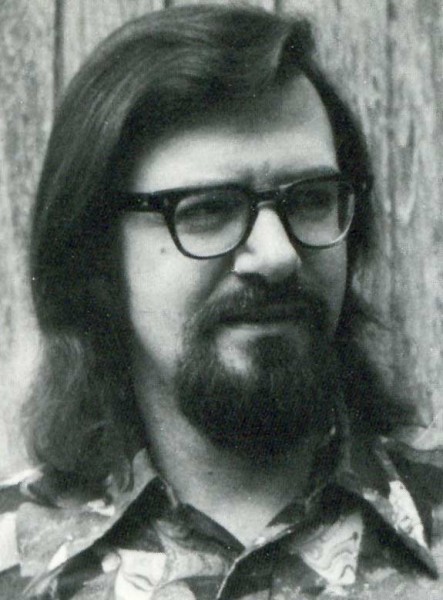
In between Terry's two wins, Judy Lynn del Rey was voted a rocket after her own death… but her husband Lester refused on her behalf, pointing out that fandom had never voted her the award while she was alive.
After Carr's second and posthumous victory, magazine and anthology editors won the award for eighteen straight years (Dozois, Datlow, and Rusch). In 2006, the last year before the award was split into Long Form and Short Form, David G. Hartwell finally won, after decades of being a runner-up. Hartwell and Carr and Judy-Lynn (if you count her) were the only book editors to win "Best Editor" during the two and half decades of the award. It is easy to see why book editors would object to this set-up, and why some of them lobbied for a change in the rules… which finally took effect in 2007, when the editorial Hugo was split into two — Best Editor, Short Form (magazines and anthologies) and Best Editor, Long Form (novels and books). Those are the rules we operate by today.
It's better in some ways, I cannot deny. But the problems persist, as I outlined above. Without credits, it is hard to know who edited what, or how much editing they had to do. Writers know this stuff (it is a small field), and other editors certainly do, but readers? Not so much. So we get the "usual suspects" syndrome, and a system that strongly favors the editors who are most visible at cons and on the internet. With smaller publishers and imprints, one can at least argue that you can judge an editor by the books that came out that year… but even that falls apart at bigger houses where a multiplicity of editors work on a long, long list of titles.
The first Long Form Hugo was awarded in 2008. It went to Patrick Nielsen-Hayden of Tor. The runners-up were Dave Hartwell of Tor, Jim Baen of Baen, Ginjer Buchanan of Ace, and Lou Anders of Pyr. The next two years, Hartwell was the victor. Beth Meacham replaced Jim Baen on the short-list those two years, but elsewise the nominees were exactly the same. After Hartwell's second victory… his third Hugo overall… David did something very classy. He withdrew himself permanently from further contention. There were other editors, great editors, who had never been recognized, and some of them deserved Hugos too. He now had three, and that was enough. David G. Hartwell bowed out gracefully.
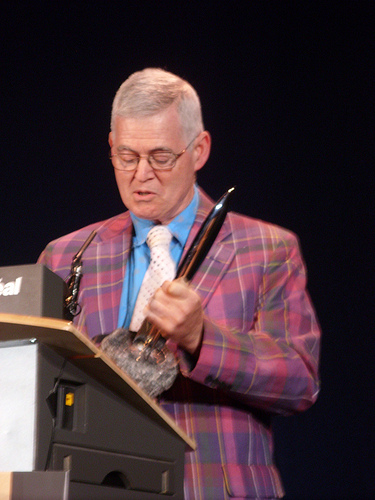
That gesture had a profound effect on the award, I think. Though the rules may say the Long Form award is intended for work published during the previous year, in truth the category had become a sort of ad-hoc "lifetime achievement" award. And that is more or less how it has continued since, due in no small part to Hartwell's noblesse.
The following year, 2010, Patrick Nielsen-Hayden won his second rocket. Following Hartwell's example, he announced during his acceptance speech that he too was withdrawing his name from further consideration. Lou Anders of Pyr won in 2011. Betsy Wollheim of DAW won in 2012, and thrilled the crowd at the award by dedicating it to her father — finally the Wollheim name had appeared on a Hugo. In 2013, PNH allowed himself to be nominated once again, stating that his wife Theresa had not been there to see him win his first two, and he wanted her to see him win one. Which he did. In 2014, Ginjer Buchanan of Ace finally got hers (LONG overdue).
These were all popular victories, and well-deserved… but what was most interesting to me was that the majority of these recent winners were following David G. Hartwell's example, and treating the award as a recognition of lifetime achievement, bowing out after their wins rather than trying to rack up ten in a row. With so may outstanding editors never having been recognized, I think this was A Very Good Thing, and I'd like to see it continue… so long as this particular category endures, at least.
Which brings us to last year, and the slates. Best Editor, Long Form was one of the Hugo categories swept by the Puppies; all five nominees appeared on one or other of the slates. Nonetheless, four of the five finalist were, to my mind, worthy nominees. Tony Weisskopf of Baen and Sheila Gilbert of DAW had each been nominated thrice before. In a normal year, the two of them would likely have battled it out for the rocket. Jim Minz of Baen and Anne Sowards of Ace were both new to the ballot, but they're both fine editors, and I expect both of them will contend again in future years.
Any of these four would have been a worthy Hugo winner. Alas, instead the "Nuclear Fans" and guilt by association prevailed, and No Award was given. Let me reiterate again: I voted No Award myself in several categories last year, categories in which I felt none of the finalists was worthy of a Hugo. But in categories where the finalists WERE Hugo worthy, I voted accordingly. Long Form was a case in point. Most of the editors nominated in this category had nothing to do with the Puppies. They did not ask to be slated, they were never consulted. Their work and careers speak for themselves. And while their names did appear on the slates, many many fans who were neither Sad nor Rabid nominated the same people because they were worthy of a Hugo (I nominated two of them myself).
I make no apologies for voting No Award in some of the other categories, where it was warranted, where all the finalists were sub-par. But in THIS category, it was NOT warranted. Sasquan should have given one of these editors a Hugo.
I hope we do not repeat the same mistake at MidAmericon II.
Which brings us back, after a long detour, to this year's nominations, and my own thoughts and recommendations for 2016.
Toni Weisskopf and Jim Minz of Baen, Anne Sowards of Ace, and Sheila Gilbert of DAW were the four legit finalists last year. All four could very well contend again this year. The Puppies are already rallying behind Toni, I see from SP4. I expect she'll be the favorite choice of both Sads and Rabids, just as Baen is their favorite publisher.
There are some other outstanding editors who deserve your consideration as well, however. So let me bring a few of them to your attention. Starting with my own editor, ANNE LESLEY GROELL, of Bantam Spectra.
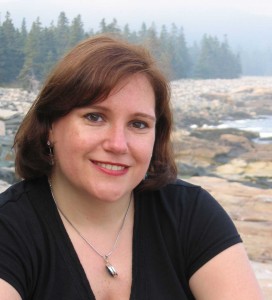
I cannot pretend to be objective here, so I won’t. Most writers love their own editors (if they didn't, they'd leave), and I am no exception. If you enjoy my Ice & Fire books, you have Anne to thank; she has been editing them since A GAME OF THRONES in 1996, and they would not be the same without her. And while WINDS did not come out in 2015, A KNIGHT OF THE SEVEN KINGDOMS did, and Anne was a big part of that as well. All that art? Anne fought to get all that in, to make the book the lavish lovely thing it was. She was nominated once before, in 2012, losing to Betsy Wollheim. She's past due for a second nomination.
And then there's Tor. David G. Hartwell has won three times, and so has Patrick Nielsen-Hayden, but there are lots of other terrific editors at Tor who deserve some recognition. DIANA PHO, who edits our Wild Cards books. MOSHE FEDER, who discovered Brandon Sanderson. HARRIET MCDOUGAL, Robert Jordan's editor who put together this year's WHEEL OF TIME COMPANION. And LIZ GORINSKY.

Liz has never won a Hugo, but she was nominee in 2010, 2011, 2012, 2013, and 2014. She would have been a nominee in 2015 as well, but she was pushed off the ballot by the slates. Instead she got an Alfie Award. She did honor to the Alfie, and she would do honor to the Hugo as well, and she certainly deserves to be returned to the ballot. One of these days soon, I expect to be making Liz wear a cone-head at a Hugo Loser's Party.
So, okay, lots of good strong candidates right here in the US of A… but you know, there are some great choices on the other side of the Atlantic as well. All the great editors are not American, you know, and the Hugo is not restricted to US companies. A lot of British and European fans joined worldcon last year to vote for Finland in 2017. I hope that most of them will take the time to nominate… and that they will look beyond the US publishing scene and rectify a decades-long injustice by nominating MALCOLM EDWARDS of Gollancz/ Orion and JANE JOHNSON of HarperCollins Voyager for the Hugo.

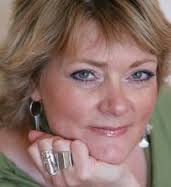
For those of you reading this who are not writers or editors and maybe don't know this stuff — Malcolm Edwards and Jane Johnson are the two giants of British SF and fantasy. You want to know what books they have edited? What authors? Start with, well, everybody. There is hardly a major writer in the field that has not worked with one or the other, or often (like me) with both. Malcolm, of course, has been a fan as well; he was GOH at one worldcon, and chaired an earlier one. Friends, and friendly rivals, they have between them helped to sustain, promote, and grow SF and fantasy for decades now. In the UK, in Australia, in South Africa and India and much of the open market, if you've been reading any SF or fantasy during the past twenty years, odds are it was edited or published by either Edwards or Johnson.
And neither one has EVER been nominated for a Hugo, let alone won.
We should fix that now. I was certain that Malcolm and Jane would finally get some recognition year before last, when worldcon went to London… but the Brits, it appears, were asleep at the switch, at least where this category was concerned.
Let's do better this year.










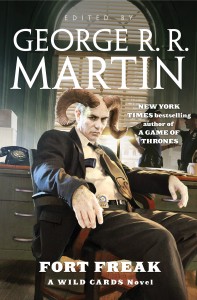
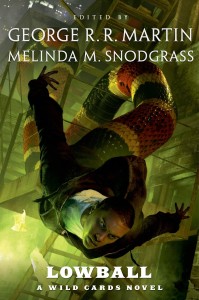
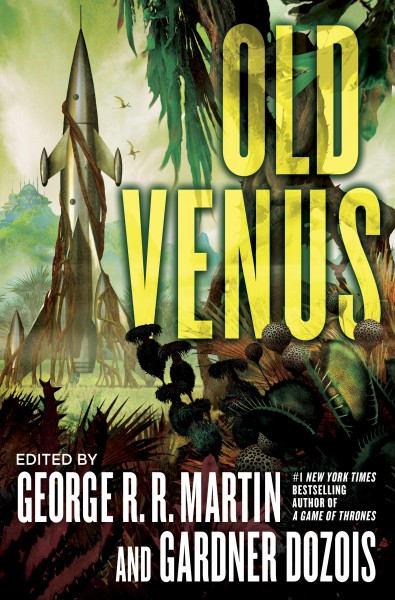
 null
null